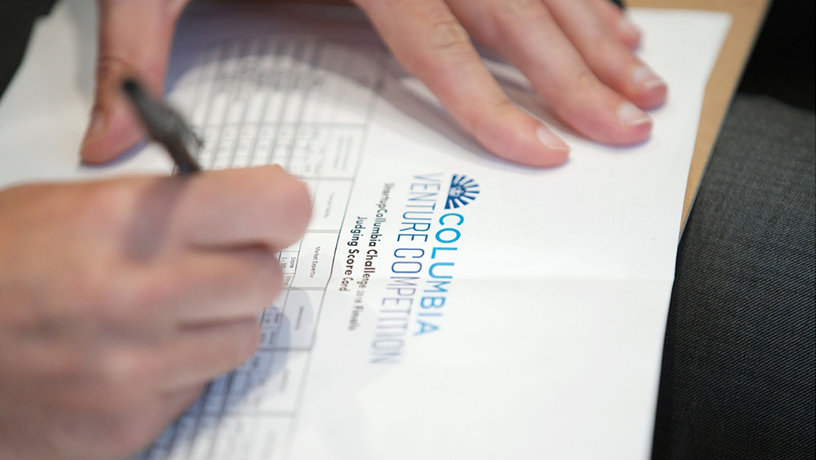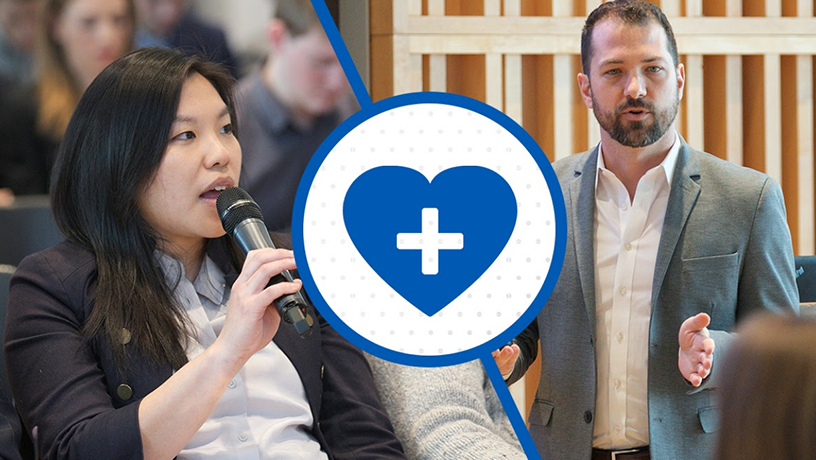Just What the Doctor Ordered
Health care entrepreneurs compete for $25K grand prize

Each year, the Columbia Venture Competition brings together students, faculty and alumni entrepreneurs to address critical issues.
Engineering entrepreneurs and alumni across Columbia are contemplating a simple question with no simple answer: How do you create a new health care idea capable of making a real difference in patients’ lives?
The inaugural Columbia-CareOne Healthcare Innovation Challenge is offering a top prize grant of $25,000 to the 42 Columbia-founded health care startups that can pioneer new models or products to benefit America’s health care system—meaning those not standardized by academic medical colleges or government legislation, such as those under the purview of your regular pharmacist, doctor, or dentist.
Pitches instead will focus on areas such as memory loss and cognitive decline, nutrition, tele-health, and aging in place, among many others. Working in spaces like these requires more than a great idea and a sharp business plan, according to Chris McGarry, senior director for Columbia Entrepreneurship, Innovation, and Design (Columbia Entrepreneurship). The recipe for success requires at least one more ingredient: a deeply human-centered approach.
“A complete health care solution in today’s America includes loved ones and family members as primary care providers,” he said. “Columbia health care founders understand that they need to deliver more than just a widget, service, or therapy. Without this understanding, the effectiveness of whatever solution they come up with is limited.”
Human-centered innovation informed how officials conceived of competition itself. The event is being generously sponsored by CareOne, a diversified health care services company, which was founded by Columbia alum Daniel E. Strauss ’78CC, whose family also includes a number of other Columbia graduates. The 20 judges called upon for this event are also alumni, all who have a wide range of experience in the sector; three Engineering alums are among the judges. One, John C. Stellabotte BS’90, is a patent attorney and partner at Ellenoff, Grossmen, and Schole. Over the years, he’s built up much expertise in patents for medical devices including pharmaceutical capsules, home pregnancy, and other diagnostic tests.
The strongest teams are the ones that have people with backgrounds that complement each other, that fill the holes in terms of experience which others on the team might not have.
A regular participant in entrepreneurship events over the past five years, Stellabotte said he feels that judging these competitions is a way of supporting the engineering community where he got his start. Beyond his science and technology education, Stellabotte noted, it was the School’s emphasis on effective written and oral communication skills that was so formative to his career. It’s that interpersonal aspect of design that teams should focus on.
“[Teams] need to tell a great story from a market standpoint, and show how their products and services have advantages over existing ones that will generate demand,” Stellabotte said. “The strongest teams are the ones that have people with backgrounds that complement each other, that fill the holes in terms of experience which others on the team might not have.”
That advice doesn’t just apply to this current challenge. The Columbia Venture Competition is just one part of the large network that is the Columbia entrepreneurship ecosystem, a sort of giant wheel with spokes that branch out into each of the University system’s schools. Another spoke is the Columbia Startup Lab, which provides space and support for 71 alumni entrepreneurs getting started on their business endeavors. Engineering alumni currently occupy around 20 seats, according to Columbia Entrepreneurship’s Director of Communications and Marketing, Yvette Miller.

According to Miller, the Columbia Entrepreneurship team believes that those kinds of physical spaces, where engineers and businesspeople and policy people and more can come together, have a critical role to play.
“Ideas are better if you get people from different backgrounds, disciplines, and industries in the same room,” she said.
That idea is carried out across Columbia Engineering Entrepreneurship’s own bevy of programs and competitions, which work to establish those connections in many other ways. In addition to entrepreneurship bootcamps, students can apply to the National Science Foundation-funded Innovation Corps (I-Corps) program, where participants get a crash course in customer discovery, with strong links directly to New York’s investment community. Columbia Engineering serves as a partner in the New York City Innovation Node, recently renewed with a $15 million grant from the NSF, and administered in partnership with NYU and CUNY.
Most of the challenges Columbia startups seek to address—health care being a prime example—are multidisciplinary by nature. Ivy Schultz, director of Columbia Engineering Entrepreneurship, has been running the program’s various competitions for the past eight years and said she is looking forward to how events like the annual Fast Pitch competition—running through November—draw students from all around the University.
“Students’ ideas come to life when they meet team members with complementary skills—our focus is on fostering a cross-campus entrepreneurship community that best supports our startups,” Schultz said.
